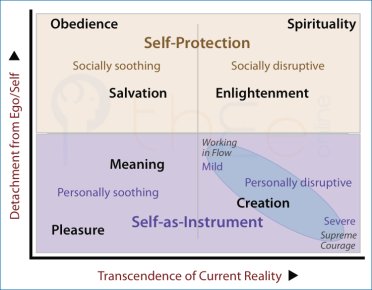Effects of Self-Detachment
I have a self with various mechanisms that determine how I handle myself in my social environment. In this context, my Primal Quest must be taken into account. The varying requirements of Quests for self-detachment, i.e. detachment from my personal interests and views, deserve closer examination and clarification
 Technical Points
Technical Points
- The ego/self cannot be discarded or permanently extinguished.
 Why?
Why?
A serious deficit in my ego/self would means that I am not able to do anything, relate to others, or function intelligently. In particular, my Quest would not be properly handled.
- Self-detachment is not identical to «self-transcendence».
 Why?
Why?
The term «self-transcendence» best fits the deliberate and focused effort to master selfish urges and undesirable attitudes. This follows from attributing «transcendence» to the upper pole in the «transcendence v actualization» process intrinsic to chosen personal endeavours. Self-development projects oriented to «self-transcendence» need not be Quest-based. Even if a project were to be so driven, this could be via a Meaning Quest, which scores relatively low on self-detachment.
Protecting the Self

Detachment from the ego/self is inherently a method for handling the self. From the TET, it is apparent that the 4 Quests in the upper half of the TET—Salvation, Enlightenment, Obedience, Spirituality—provide for substantial self-protection and this generates an affinity amongst them. Each quadrant does, however, affect the personal and social impact of this self-protection.
Discretionary interaction via Salvation or Obedience Quests usually appears to be ethical and in conformity with social institutions. As a result these Quests are socially soothing, and that enhances their self-protective quality.
- Salvation protects the self because
 it enables projection of weakness and suffering, and then personal care for whoever is embodying that weakness and suffering.
it enables projection of weakness and suffering, and then personal care for whoever is embodying that weakness and suffering.
- Obedience protects the self because
 it occurs within an institution that is established and relatively powerful within society, and then ensures that its rules, rituals and commandments are followed.
it occurs within an institution that is established and relatively powerful within society, and then ensures that its rules, rituals and commandments are followed.
Knowing clearly via Enlightenment or Spirituality Quests is socially disruptive, because it undermines the soothing illusions promoted by governmental and religious institutions. Existential truths tend to frighten, upset or confuse people.
- Enlightenment protects the self because
 it strives to accept and integrate the self, understands its nature and needs, and develops considerable mastery over social situations.
it strives to accept and integrate the self, understands its nature and needs, and develops considerable mastery over social situations.
- Spirituality protects the self because
 it merges the self with the divine while also viewing it as illusory.
it merges the self with the divine while also viewing it as illusory.
Self-as-Instrument
The 3 Quests in the lower half of the TET—Meaning, Creation, Pleasure—demand that you use the self as an instrument, while also ensuring a degree of detachment. Using the self entails knowing your self sufficiently, applying aspects of your self as appropriate, and putting your self at risk of harm.
Feeling good via Meaning and Pleasure Quests requires use of the self as an instrument. As can be easily imagined, this is personally soothing.
- Meaning uses and soothes the self because
 it empathizes with others, gets support, and pursues viable and desirable projects to sustain its own ideals.
it empathizes with others, gets support, and pursues viable and desirable projects to sustain its own ideals.
- Pleasure uses and soothes the self because
 organizing pleasures is a task for the self and is also gratifying, while experiencing pleasure is relaxing and often invigorating.
organizing pleasures is a task for the self and is also gratifying, while experiencing pleasure is relaxing and often invigorating.
Entangled activities within any Creation Quest also use the self as an instrument, but these inexorably generate personal disruption.
- Supreme-Courage creates severe disruption for the self because
 creative efforts persevere despite extremes of frustration, disappointments, rejections, obstacles and blind alleys.
creative efforts persevere despite extremes of frustration, disappointments, rejections, obstacles and blind alleys.
- Work-in-Flow creates minimal disruption for the self because
 creative efforts are integrated within existing work demands, often in a non-ideal but accepted employment setting.
creative efforts are integrated within existing work demands, often in a non-ideal but accepted employment setting.
 But if work-in-flow is enjoyable, how is it disruptive?
But if work-in-flow is enjoyable, how is it disruptive?
The personal disruption comes from spending more time than might be organizationally efficient or economically sensible. There can easily be conflict with a manager (seeking efficiency and economy) or a customer (seeking usability and idiosyncratic preferences). Such demands disturb «rightness»: interference and criticisms disrupt the creative flow.
- Now consider choice of a Primal Quest by those with a damaged self.
Originally posted: 27-Jul-2012.

 But if work-in-flow is enjoyable, how is it disruptive?
But if work-in-flow is enjoyable, how is it disruptive?